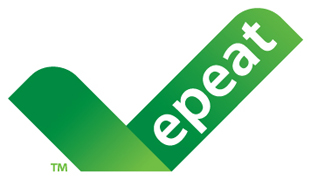
EPEAT®
Samsung is committed to meeting the standards required by EPEAT, the Electronic Product Environmental Assessment Tool, which is an online registry for greener electronics. EPEAT was established by a grant by the U.S EPA, and the standards were developed through a multi-stakeholder process involving nonprofit organizations, manufactures, government and purchasers.
Computers, Displays, and Tablets - IEEE 1680.1 Standard (select criterion):
-
4.3.1.1 Identification of materials and components requiring selective treatment
Within a year after EPEAT-registered product is put on the market, Samsung will provide reuse and recycling facilities information on identifying the presence and location of all martials and components that require selective treatment as well as information regarding lithium batteries, including method of attachment, how to remove the battery and the tools required to do so. This information will be available on the Special Handling Needs website.
-
4.4.2.2 Publicly available service information
Samsung will provide service and repair information for the product. This information can be found on our Public Service Information website.
-
4.4.2.3 Spare Parts
Samsung will provide information regarding if spare parts are available for use in the repair of a product. This information can be found on our Public Service Information and Spare Parts website.
-
4.4.2.4 Battery Replacement and Information
For products containing a battery, Samsung provides information on how to obtain and replace the battery of the product. Please visit our Special Handling Needs website for more information.
-
4.7.3.1 Recycled content in wood-based fiber packaging
Samsung's wood-based fiber packaging contain a minimum of 35% recycled content by total weight of wood-based fiber. You can find our declaration of percentage recycled content on our Recycled Content in Wood-based Fiber Packaging website.
-
4.8.1.1 Product life cycle assessment and public disclosure analysis
Samsung conducts a life cycle assessment (LCA) on any one of its covered products at least every three years using ISO 14044 & ISO 14040. The LCA will assess the product from raw material extraction through end of life. You can find more information regarding LCA in our : Life Cycle Assessment for Mobile products and displays report.
-
4.8.1.2 Product specific greenhouse gas emissions - product carbon footprint (PCF)
Within two months after EPEAT-registered product is put on the market, Samsung will conduct an assessment of life cycle greenhouse gas emissions of the product from raw material extraction up until the products end of life. Samsung will also update the PCF every three years and you can find a summary of PCF results in our : Product Carbon Footprint (PCF) Results for Mobile Products and Displays Report
-
4.8.2.2 Greenhouse gas emissions from product transport
Samsung's assessment of greenhouse gas (GHG) emissions resulting from the transport of products. Annual GHG Transport Emissions Report
-
4.9.2.2 Corporate environmental performance reporting by suppliers
Samsung provides supplier environmental performance with Samsung Sustainability Report and additional Supplier environment information. For more information, please visit link.
-
4.9.3.2 Optional-Energy management system/energy performance improvement for suppliers
Samsung is committed to meeting the required EPEAT standards by providing supplier's information of Energy management system certification. Supplier EMS Certs
-
4.10.2.1 Public disclosure regarding conflict minerals in products
On an annual basis, Samsung provides information on the use of necessary conflict minerals in its products including its sourcing policy, how Samsung conducted reasonable country of origin inquiry (RCOI) with its suppliers, publication of the list of smelters or refiners reported by those suppliers as well as the measures Samsung has conducted on the source and chain of custody of conflict materials in products that may have originated from conflict-affected regions. For more information, please visit our Responsible Management of Supply Chain website and the latest version of Samsung Sustainability Report.
Mobile Phones - UL 110 Standard (select criterion):
-
11.3.2 Battery removability instructions
For products containing a battery, Samsung provides information on how to obtain and replace the battery of the product. Please visit our Special Handling Needs website for more information.
-
11.8.1 Notification regarding and the identification of materials and components requiring selective treatment
Within a year after EPEAT-registered product is put on the market, Samsung will provide reuse and recycling facilities information on identifying the presence and location of all martials and components that require selective treatment as well as information regarding lithium batteries, including method of attachment, how to remove the battery and the tools required to do. This information will be available on the Special Handling Needs website
IEEE 1680.3 Standard:
-
4.3.3.1 Notification regarding and the identification of materials and components with special handling needs
Within a year after EPEAT-registered product is put on the market, Samsung will provide reuse and recycling facilities information that help identify the presence and location of all materials and components demonstrating hazardous characteristics requiring special handling. This information is available on our Special Handling Needs website.
